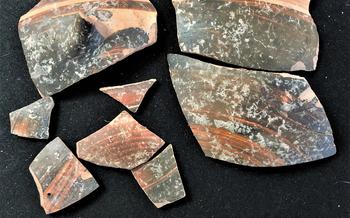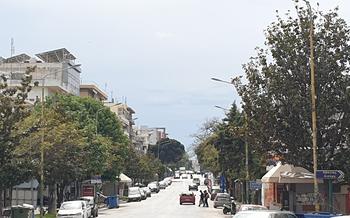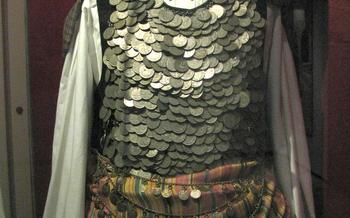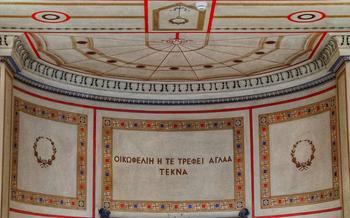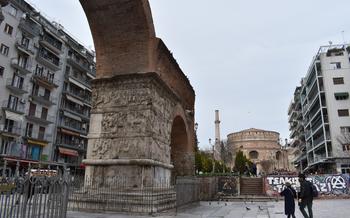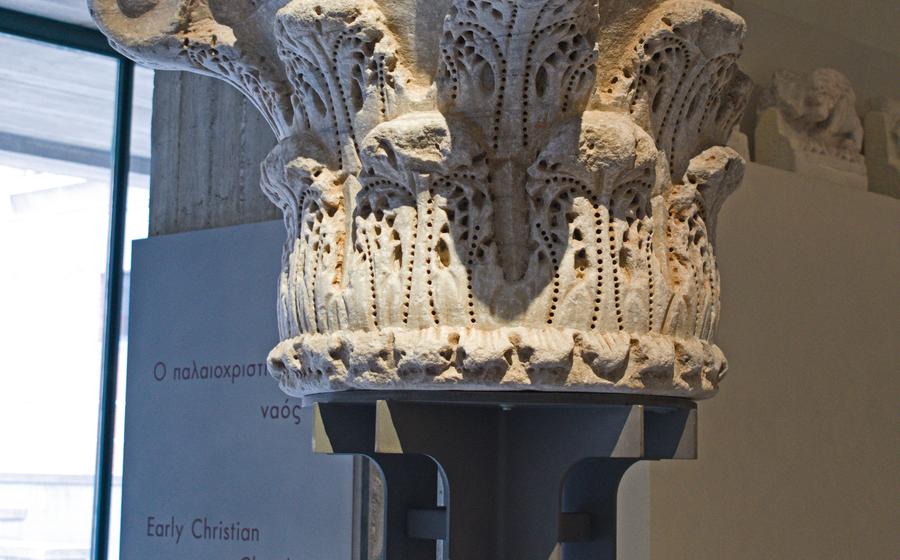
Museum of Byzantine Culture
- Museum of Byzantine Culture: A Journey Through History
- Location and Accessibility:
- Guided Tours and Audio Guides
- Temporary Exhibitions and Special Events
- Museum Shop and Bookstore
- Educational Programs and Workshops:
- Accessibility for Individuals with Disabilities
- Museum Publications and Research
- Museum Cafeteria and Amenities
- Nearby Attractions and Points of Interest
- Photography and Social Media
- Community Outreach and Engagement
- Insider Tip:
Museum of Byzantine Culture: A Journey Through History
The Museum of Byzantine Culture in Thessaloniki, Greece, is a treasure trove of art and history, offering visitors a glimpse into the rich cultural heritage of the Byzantine Empire. Established in 1994, the museum houses a remarkable collection of over 11,000 artifacts, spanning from the 4th to the 15th century AD. The museum's architectural design is a masterpiece in itself, featuring a striking modern facade that seamlessly blends with the Byzantine-inspired interior, creating a unique and harmonious space.
The exhibits at the Museum of Byzantine Culture are a testament to the empire's artistic and cultural achievements. Visitors can marvel at exquisite icons, intricate mosaics, stunning sculptures, and precious metalwork, each piece a testament to the skill and artistry of Byzantine craftsmen. The museum's educational programs and outreach initiatives further enhance the visitor experience, providing opportunities for learning and engagement with the Byzantine past.
Location and Accessibility:
The Museum of Byzantine Culture is situated in the heart of Thessaloniki, Greece, at 2 Stratou Avenue. It is easily accessible by public transportation, with bus stops located nearby. The museum also offers ample parking spaces for visitors arriving by car. For individuals with disabilities, the museum is fully accessible, with wheelchair ramps, elevators, and designated accessible restrooms.
Guided Tours and Audio Guides
The Museum of Byzantine Culture offers guided tours in a variety of languages, including English, Greek, French, German, Italian, and Spanish, providing visitors with an in-depth understanding of the museum's collection and its historical significance. Guided tours can be booked in advance online or upon arrival at the museum, subject to availability.
The cost of a guided tour is typically included in the museum's admission fee, but group rates and discounts may be available for larger groups. For a more personalized experience, private tours can also be arranged with advance notice.
For those who prefer a self-paced exploration, audio guides are available in multiple languages, allowing visitors to explore the museum's exhibits at their own pace. Audio guides can be rented at the museum's information desk for a nominal fee.
Whether you choose to embark on a guided tour or explore the museum independently with an audio guide, the Museum of Byzantine Culture offers a rich and engaging experience for visitors of all ages and interests.
Temporary Exhibitions and Special Events
The Museum of Byzantine Culture frequently hosts temporary exhibitions and special events that complement its permanent collection and provide visitors with a diverse range of experiences. These exhibitions often delve into specific themes or periods of Byzantine history, showcasing rare artifacts, contemporary art, or innovative interpretations of Byzantine culture.
For art enthusiasts and those seeking a more immersive experience, the museum organizes workshops, lectures, and demonstrations by renowned scholars, artists, and historians. These events offer unique opportunities to engage with experts, learn about the latest research, and gain a deeper understanding of Byzantine art and history.
To stay informed about upcoming exhibitions and events, visitors can check the museum's website or social media pages. Advance registration or ticketing may be required for certain events, so it's advisable to plan ahead to avoid disappointment.
Participating in temporary exhibitions and special events at the Museum of Byzantine Culture is a great way to broaden your knowledge, discover new perspectives, and engage with the vibrant community of scholars and enthusiasts who are passionate about Byzantine heritage.
Museum Shop and Bookstore
The Museum of Byzantine Culture houses a well-stocked museum shop that offers a diverse range of souvenirs, gifts, and educational materials for visitors to take home. From intricate replicas of Byzantine art and jewelry to finely crafted ceramics and textiles, the shop provides a unique opportunity to acquire a piece of history and support the museum's mission.
A carefully curated selection of books, catalogs, and publications is available, delving into the rich history, art, and culture of the Byzantine era. These publications provide a deeper understanding of the exhibits and serve as a valuable resource for scholars, students, and enthusiasts alike.
Unique items inspired by Byzantine art and history, such as hand-painted ornaments, decorative plates, and artisanal jewelry, make for thoughtful gifts or personal keepsakes. By purchasing from the museum shop, visitors not only enhance their own appreciation of Byzantine culture but also contribute to the museum's ongoing preservation and educational efforts.
Educational Programs and Workshops:
The Museum of Byzantine Culture extends its impact beyond its walls through a range of educational programs and workshops. School groups are invited to embark on guided tours tailored to their curriculum, fostering hands-on learning experiences and sparking a passion for history. Families can participate in interactive workshops where children engage in creative activities inspired by Byzantine art. These sessions allow younger visitors to explore the museum's collection in a fun and engaging way, nurturing their curiosity and cultivating an appreciation for cultural heritage.
For those seeking deeper immersion, the museum offers specialized workshops and seminars. Art enthusiasts can delve into the intricacies of Byzantine iconography or mosaic techniques, gaining insights from experts in the field. These programs provide a unique opportunity for participants to learn from renowned scholars and practitioners, fostering a deeper understanding of Byzantine art and its enduring legacy.
Advance booking is recommended for both school groups and individuals wishing to participate in workshops and seminars. The museum's website provides detailed information about upcoming programs, registration procedures, and fees.
Accessibility for Individuals with Disabilities
At the Museum of Byzantine Culture, inclusivity and accessibility are prioritized to ensure that all visitors can enjoy and engage with the museum's offerings.
Wheelchair users and individuals with mobility challenges will find ramps and elevators throughout the museum, facilitating seamless navigation. For those who require sign language interpretation or assistive devices, advance arrangements can be made to accommodate their needs.
Quiet spaces and sensory-friendly areas are available for visitors who may need a break from the stimulation of the galleries. These designated areas provide a calming environment for reflection and relaxation.
The museum's educational programs and activities are designed to be inclusive, catering to diverse learning styles and abilities. Interactive exhibits and hands-on workshops are adapted to ensure that everyone can participate and benefit from the educational experience.
The Museum of Byzantine Culture is committed to creating a welcoming and accessible environment for all visitors, enabling everyone to explore and appreciate the wonders of Byzantine art and history.
Museum Publications and Research
The Museum of Byzantine Culture is not only a repository of Byzantine art and history but also a hub for scholarly research and discourse. The museum's commitment to research and scholarship is reflected in its extensive collection of publications, ongoing research projects, and collaborations with academic institutions worldwide.
The museum's publications include scholarly journals, catalogs, and books that explore diverse aspects of Byzantine art and culture. These publications are meticulously researched and edited by the museum's team of experts and contribute significantly to the advancement of Byzantine studies. The museum's library and archives are also accessible to researchers, providing a wealth of primary sources and specialized literature.
The museum actively collaborates with universities, research institutions, and international organizations to conduct joint research projects and organize symposia, workshops, and conferences. These collaborations foster intellectual exchange, promote interdisciplinary research, and create opportunities for researchers to engage with the museum's collection and expertise.
Museum Cafeteria and Amenities
Amidst your cultural exploration, the Museum of Byzantine Culture provides a welcoming respite with its on-site cafeteria. Whether you seek a quick refreshment or a leisurely meal, the cafeteria offers a delightful menu of local specialties and international favorites. Savor the flavors of traditional Greek cuisine, including freshly prepared salads, savory pies, and delectable pastries. Enjoy the vibrant atmosphere as you dine indoors or take advantage of the outdoor seating area to bask in the Mediterranean sunshine.
The cafeteria also features a well-stocked bar, where you can indulge in a variety of beverages, including aromatic coffees, refreshing juices, and a selection of local wines. Whether you need a caffeine boost to power through the exhibits or a refreshing drink to cool off after your exploration, the cafeteria has you covered.
Restrooms within the museum are meticulously maintained, ensuring a comfortable and hygienic experience for all visitors. Take a moment to freshen up or simply relax and recharge before continuing your journey through Byzantine history.
Nearby Attractions and Points of Interest
The Museum of Byzantine Culture stands as a gateway to Thessaloniki's rich cultural heritage and historical tapestry. After delving into the depths of Byzantine art and history, visitors can embark on a journey of exploration through the city's vibrant streets and iconic landmarks. Just a stone's throw away from the museum, the White Tower, a symbol of Thessaloniki's resilience, beckons travelers to unravel its captivating tales.
For those seeking a spiritual connection, the Church of Agia Sophia and the Rotunda of Galerius offer an awe-inspiring spectacle of Byzantine architecture and mosaics. Immerse yourself in the city's vibrant art scene at the Thessaloniki Museum of Modern Art or discover the treasures of ancient Greece at the Archaeological Museum of Thessaloniki.
Strolling along the picturesque Aristotelous Square, visitors can soak in the city's vibrant atmosphere and indulge in culinary delights at traditional tavernas. For panoramic vistas, ascend to the Ano Poli, the city's old town, where narrow cobbled streets lead to hidden gems and breathtaking views.
Venture beyond the city center to explore the Thermaikos Gulf, renowned for its pristine beaches and inviting waters. Take a leisurely stroll along the Nea Paralia promenade, lined with cafés and restaurants, or embark on a scenic boat trip to the nearby islands. Immerse yourself in the natural beauty of the region at the Seih Sou Forest, a sprawling green oasis just a short drive from the city.
Photography and Social Media
At the Museum of Byzantine Culture, capturing the beauty and grandeur of the exhibits through photography is highly encouraged. Visitors are welcome to take pictures for personal use, as long as they adhere to the museum's guidelines. Flash photography and the use of tripods are generally restricted to preserve the integrity of the artifacts and ensure a comfortable viewing experience for all visitors.
Sharing your Byzantine adventure on social media is a fantastic way to connect with fellow art enthusiasts and inspire others to explore this cultural gem. Tag your photos with #MuseumofByzantineCulture and follow the museum's official social media accounts for updates, behind-the-scenes glimpses, and engaging content.
The Museum of Byzantine Culture actively encourages user-generated content. Share your experiences, insights, and favorite artifacts, and become part of the museum's vibrant online community. Join the conversation, ask questions, and share your love for Byzantine art with the world.
Community Outreach and Engagement
The Museum of Byzantine Culture extends its impact beyond its walls through various community outreach and engagement initiatives. The museum actively participates in local events, bringing Byzantine art and history to life for a broader audience. Educational outreach programs are designed to engage students of all ages, fostering an appreciation for Byzantine culture. The museum also welcomes volunteers who contribute their time and skills to support its mission. Through collaborations with local organizations and institutions, the Museum of Byzantine Culture plays a vital role in promoting cultural heritage and fostering a sense of community in Thessaloniki.
Insider Tip:
For an intimate and serene experience, consider visiting the Museum of Byzantine Culture early in the morning or late in the afternoon, when the crowds are typically smaller. Take advantage of this tranquil atmosphere to immerse yourself in the rich collection without distractions.
As you explore the museum's layout, keep an eye out for the hidden gem known as the "Secret Garden." Located on the ground floor, this serene oasis offers a tranquil escape from the bustling museum halls. Relax amidst the lush greenery and savor the peaceful ambiance before continuing your exploration.
To fully appreciate the museum's treasures, consider joining a guided tour led by one of the knowledgeable docents. These tours provide insightful commentary and anecdotes that bring the Byzantine era to life. Advance booking is recommended to secure your spot.
Finally, to make the most of your visit, combine your museum experience with a stroll through the vibrant streets of Thessaloniki. Explore the city's historic landmarks, savor the delicious local cuisine, and soak up the vibrant atmosphere. This combination of cultural immersion will leave you with a lasting appreciation for the rich heritage of Greece.
